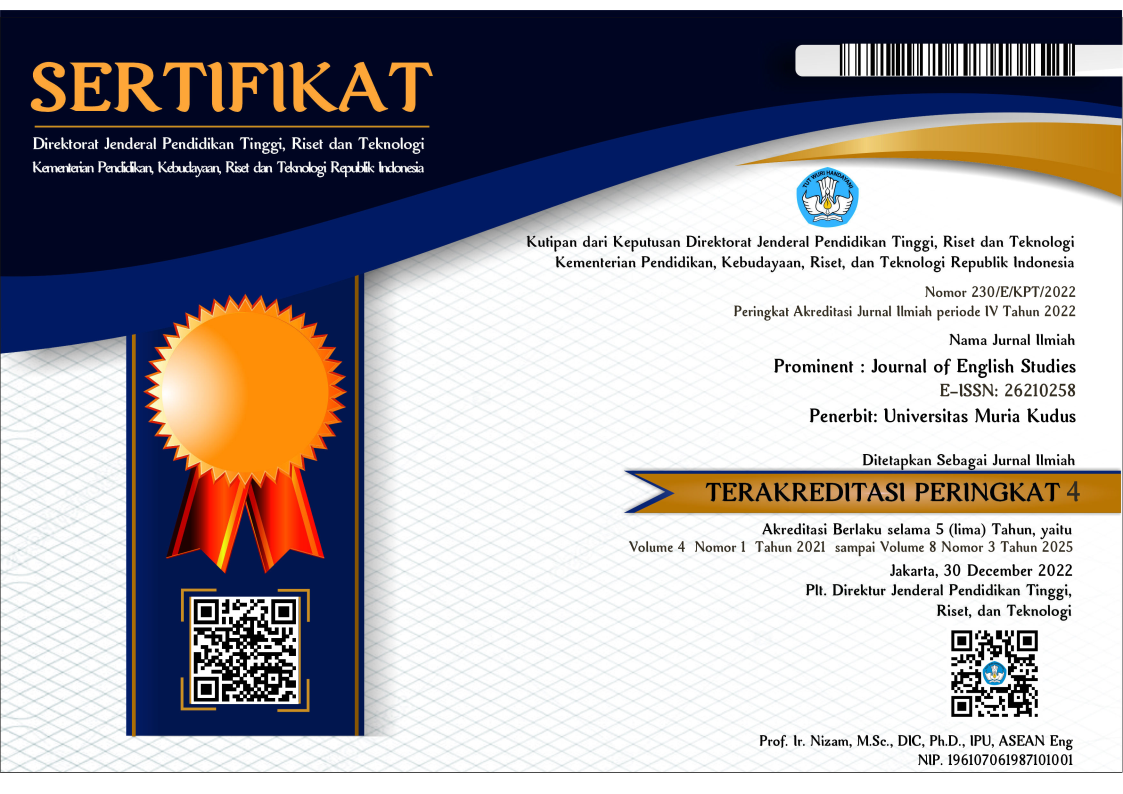VOCABULARY MASTERY STRATEGIES USED BY INDONESIAN EXTENSIVE READING LEARNERS
Abstract
Vocabulary mastery is a key aspect of foreign language leaning. Various methods can be used to improve vocabulary mastery. This present study was conducted to find out what strategies the learners of the Extensive Reading Course used in mastering the vocabulary in an English Language Education Program (ELEP) at a private university in Central Java, Indonesia, based on the Schmitt (2000) theory. The strategies discussed in this study are the determination, metacognitive, cognitive, memory and social strategy. In this study, a qualitative research design was applied to collect the data using questionnaire with open-ended questions. There were fifty-six participants of three Extensive Reading classes for this study. The result of the study showed that the determination strategy was the most preferable. Most of the participants used that strategy to enrich their vocabulary, while the social strategy was the least used. It was found that most of ER learners used determination strategies to mastery vocabulary.
Keywords
References
Alqahtani, M. (2015). The importance of vocabulary in language learning and how to be taught. International Journal of Teaching and Education 3(3), 21-34. doi:10.20472/TE.2015.3.3.002
Arndt, H, L., & Woore, R. (2018). Vocabulary learning from watching YouTube videos and reading blog posts. Language Learning & Technology 22(1), 124–142 doi:10125/44660
Asgari, M., & Mustapha, G, B. (2011). The type of vocabulary learning strategies used by ESL students in University Putra Malaysia. English Language Teaching 4(2) 84-90. doi:10.5539/elt.v4n2p84
Astalin, P, K. Qualitative research designs: a conceptual framework. International Journal of Social Science & Interdisciplinary Research 2(1), 118-124. Retrieved from https://pdfs.semanticscholar.org/baa7/c8f5577b0b1798b5e9f559f5cbae32bf1a36.pdf
Cambridge University Press. (2018). Extensive reading in ELT: Why and how? Retrieved from https://languageresearch.cambridge.org/images/Language_Research/CambridgePapers/CambridgePapersinELT_ExtensiveReading_2017_ONLINE.pdf
Day, R, R., & Bamford, J. (1998). Extensive reading in the second language classroom. New York: Cambridge University Press.
Dwitama, S, D. (2015). Vocabulary learning strategies used by FLL students in extensive reading class (Sarjana Pendidikan Degree, Universitas Kristen Satya Wacana) Retrieved from http://repository.uksw.edu/bitstream/123456789/9851/2/T1_112008074_Full%20text.pdf
Easterbrook, R, M. (2013). The process of vocabulary learning: vocabulary learning strategies and beliefs about language and language learning (Doctor of Philosophy in Education, The University of Canberra) Retrieved from http://www.canberra.edu.au/researchrepository/file/3384527a-1649-4e50-b61f-32a9979276e6/1/introductory_pages.pdf
Elley, W, B. (1992). How in the world do students read? The IEA study of reading literacy. American Journal of Educational Research 3(2), 126-136. doi:10.12691/education-3-2-4
Flavell, J. H. (1993). Young children's understanding of thinking and consciousness. Current Directions in Psychological Science 2(2), 40–43. doi: 10.1111/1467-8721.ep10770682
Gagne, R. M. (1977). The condition of learning. 3rd Edition, Holt, Rinehart, and Winston, New York.
He, Y. (2010). A study of l2 vocabulary learning strategies (Kristianstad University, The School of Teacher Education English IV). Retrieved from http://www.divaportal.org/smash/get/diva2:326994/fulltext01.pdf
Huettig, F., & Pickering, M, J. Literacy advantages beyond reading: Prediction of spoken language. Trends in Cognitive Sciences 23(6), 464-475. doi:10.1016/j.tics.2019.03.008
International Literacy Association. (2019). Literacy Leadership Brief: Creating passionate readers through independent reading. Retrieved from https://www.literacyworldwide.org/docs/default-source/where-we-stand/ila-creating-passionate-readers-through-independent-reading.pdf
Javid, C, Z. (2014). A comparative determination of vocabulary learning strategies of Saudi EFL learners. Research Journal of Recent Sciences 3(12), 32-41.
Lin, D, T. (2016) Investigating guided extensive reading and vocabulary knowledge performance among remedial ESL learners in a public university in Malaysia (Doctor of Philosophy, Universiti Sains Malaysia). Retrieved from https://core.ac.uk/download/pdf/78388981.pdf
Oxfam. (2019). Conducting semi-structured interviews. Retrieved from https://itp.nyu.edu/classes/fungus/interview_technique/conductingInterviews.pdf
Pratama, M. F., Setiyadi, A. B., & Flora, F. (2015). The influence of language learning strategies towards reading comprehension. U-JET 4(6), 1–11.
Schmitt, N. (2000). Vocabulary in Language Teaching. Cambridge University Press, Cambridge.
Singer, E., & Couper, M. P. (2017). Some Methodological Uses of Responses to Open Questions and Other Verbatim Comments in Quantitative Surveys. Methods, data, analyses: a journal for quantitative methods and survey methodology (mda), 11(2), 115-134. doi:10.12758/mda
Smith, F. (1978). Understanding reading: a psycholinguistic analysis of reading and learning to read (2nd ed). New York: Holt, Rinehart and Winston.
Sonbul, S., & Schmitt, N. (2010). Direct teaching of vocabulary after reading: is it worth the effort?. ELT Journal 63(4), 253–60. doi:10.1093/elt/ccp059
Teng, F. (2015). The effectiveness of Extensive Reading on EFL learners’ vocabulary learning: Incidental versus intentional learning. Brazilian English Language Teaching Journal 6(1), 66-80. doi:10.15448/2178-3640.2015.1.20033
Zohrabi, M. (2013). Mixed method research: Instruments, validity, reliability and reporting findings. Academi Publisher 3(2), 254-262. doi:10.4304/tpls.3.2.254-262
DOI: https://doi.org/10.24176/pro.v4i1.5731
Refbacks
- There are currently no refbacks.
Prominent Journal of English Studies is licensed under a Creative Commons Attribution-ShareAlike 4.0 International License.
Dedicated to:

in Collaboration with APSPBI:





